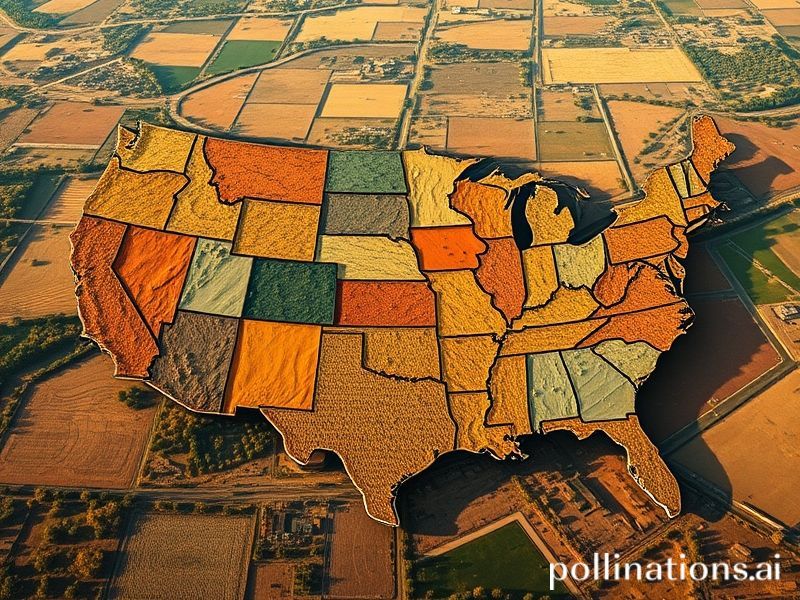Fifty States, One Planet: How America’s Messy Federal Experiment Became the World’s Favorite Reality Show
The United States, that vast laboratory of late-stage capitalism and earnest flag-waving, has always insisted on packaging itself in neat little bundles. Fifty of them, to be precise—states, commonwealths, and one District that pays taxes without representation, a civic arrangement that would make any European monarch blush. To the rest of the planet, this tidy grid is less a map than a mood board of American neuroses: greed in New York, vanity in California, paranoia in Texas, and an almost touching belief that somewhere in the Midwest the 1950s are still playing on an endless loop.
From Singapore trading floors to Nairobi start-up hubs, the fifty-state mythology is treated as both cautionary tale and instruction manual. Chinese venture capitalists study Colorado’s cannabis regulations the way Cold War Kremlinologists once parsed Iowa caucus results. Brussels bureaucrats, exhausted by Brexit whiplash, gaze longingly at the comparatively bloodless annexation of Hawaii—no referendums, just pineapples and strategic naval bases. Meanwhile, Russian troll farms keep color-coded spreadsheets assigning each state its own bespoke disinformation flavor: anti-vax memes for Oregon, Second Amendment cosplay for Alabama, and for Florida, whatever hallucinogen is currently trending on Key Biscayne.
The international fascination is understandable. Each state functions as a sovereign franchise, complete with its own slogan, specialty dessert, and capacity for institutional cruelty. Texas executes, Vermont maple-shames, and Delaware—population smaller than Valencia—houses more shell companies than the Cayman Islands, a fiscal magic trick admired from Lagos to Luxembourg. The arrangement lets the world outsource moral outrage: condemn Georgia’s voting laws while happily loading up on Boeing shares, tut-tut at Alabama’s abortion bans while streaming Silicon Valley’s latest surveillance app.
Europeans, forever wrestling with the contradictions of a half-built federation, watch the American model like a telenovela. They see California negotiating its own climate treaties with Bavaria, a diplomatic polyamory that makes the EU’s own cohesion funds look positively monogamous. Yet they also note the quiet secession already underway: Texas flirts with an independent power grid the way a bored spouse browses Ashley Madison, while New Hampshire hoards gold and guns like a prepper Switzerland. If America ever formally fractures, the divorce papers will cite irreconcilable differences over pronouns and pickup trucks.
Meanwhile, the Global South absorbs the states’ cultural runoff the way coral absorbs microplastics. Lagos DJs sample Memphis trap beats, Mumbai call-center agents practice Minnesota nice, and Colombian avocado growers pray nightly to the altar of Whole Foods signage. The irony, of course, is that most Americans couldn’t locate these countries on a map even if you offered them unlimited ranch dressing. Yet the gravitational pull of fifty self-important market segments continues to warp everything from supply chains to slang. When a Bangkok street vendor names his noodle cart “Kentucky Fried Pad Thai,” he’s not being post-colonial; he’s just reading the algorithmic entrails.
And so the world watches, half-horrified, half-envious, as the United States performs its perpetual stress test in public. Each state is a petri dish, every governor a minor-league Augustus, every legislative tantrum live-streamed for foreign schadenfreude. The lesson is not that America will collapse—empires rarely die, they just rebrand—but that the fifty-state circus offers a menu of dysfunction any nation can order à la carte. Want hyper-polarization? Try the Rust Belt special. Prefer tech-driven inequality? California’s your jam. Cringe at performative patriotism? May I interest you in a Texas-sized portion?
In the end, the international takeaway is both grim and oddly reassuring: no matter how badly your own country bungles its affairs, somewhere between Honolulu and Hartford there’s a state doing it worse—and posting the highlight reel on TikTok. The United States remains the world’s most generous exporter of cautionary tales, conveniently packaged in fifty easy-to-digest servings. Consume responsibly; side effects may include existential dread and sudden cravings for barbecue.







